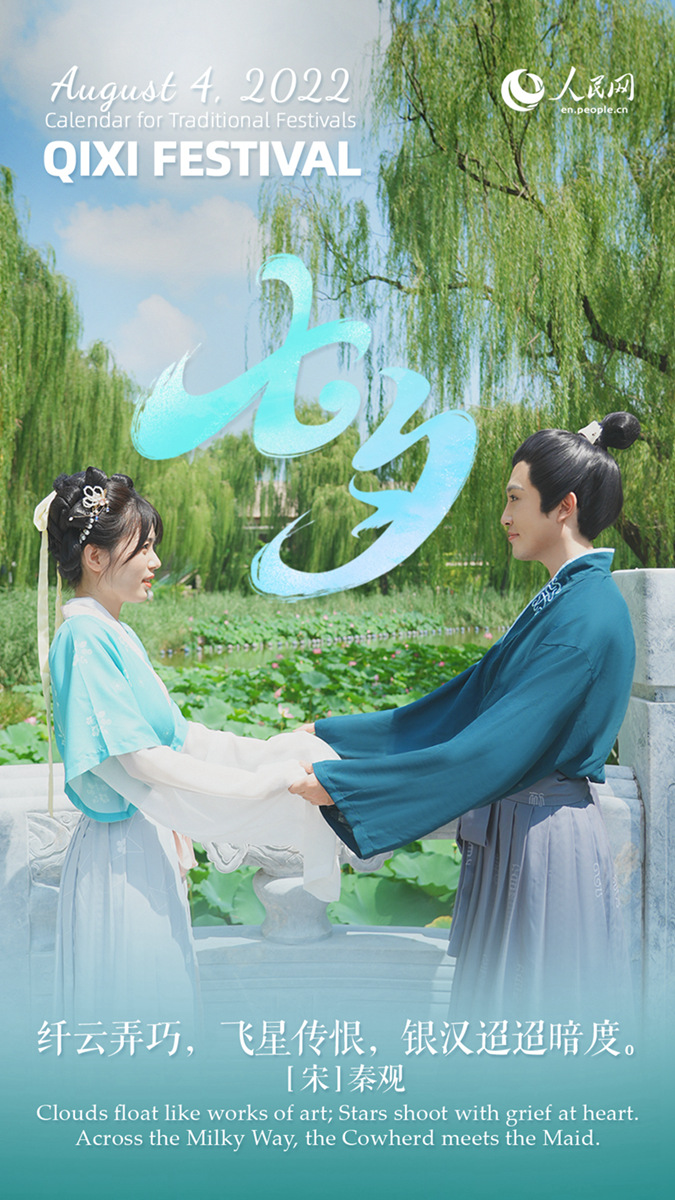Calendar for Traditional Festivals: Qixi Festival
The Double Seventh Festival, or Qixi Festival, falls on the seventh day of the seventh lunar month. Double Seventh Festival is considered to be the most romantic of traditional Chinese festivals, earning it the title of "Chinese Valentine's Day." This romantic festival has a long history and has been celebrated since the Han Dynasty (202 BC – 220 AD). It was added to the National Intangible Cultural Heritage List by the State Council of China in 2006.
Origins
The festival originated from the tale of The Cowherd and the Weaver Girl, one of the four most famous pieces of ancient Chinese folklore. The earliest-known reference to this myth dates back to over 2,600 years ago.
The story tells of the love between Zhinyu (the Weaver Girl, symbolizing Vega) and Niulang (the Cowherd, symbolizing Altair). As the most capable weaver fairy in heaven, Zhinyu's love for Niulang, a mortal, enraged the gods, who separated the couple with the Silver River (symbolizing the Milky Way). Although the gods were consumed with fury, the couple's love did win some of their sympathy, and they allowed the two to meet over the Silver River once a year. On the 7th day of the 7th lunar month, a flock of magpies would form a bridge so that the lovers could be reunited.
As far back as the Han Dynasty, the practices of the festival were conducted in accordance with formal ceremonial state rituals. Over time, the festival activities also came to include customs practiced by the common people. Though it originated in China, the Qixi Festival inspired the Tanabata festival in Japan, Chilseok festival in Korea, and Th?t T?ch festival in Vietnam.
Customs of Qixi Festival
? Spot Niulang and Zhinyu in the Night Sky
On this day, Chinese people will look up towards the sky to look for Vega and Altair shining in the Milky Way, while a third star forms a symbolic bridge between the two stars. Given a clear night sky, you can find Altair which is the middle of three stars to the east of the Milky Way, while Vega is in a cluster of six just to the west.
? Give Handmade Gifts
Zhinyu was a very skilled weaver with almost magical hands. Traditionally, girls would pray for needlework ability, a traditional skill for a good wife, as well as a happy marriage. Thus this festival is also called “Qiqiao Festival,” literally Begging for Skills Festival.
Although girls nowadays no longer need weaving skills, knitting and crafting are still rather popular among young people. Some girls like to make handmade scarves or hats for their loved ones to express their love and appreciation.
? Plan a Romantic Date
The love story of Niulang and Zhinyu, and the Qixi Festival have been handed down for generations. People now are increasingly delving into ancient Chinese culture and history, and are giving new meaning to the Qixi Festival.
Celebrations include giving gifts to romantic partners, planning romantic dates for dinners, movies, travels, etc. Many people will also choose to register as couples on this day.

Related:
Calendar for Traditional Festivals: Dragon Boat Festival
Calendar for Traditional Festivals: Lantern Festival
Photos
Related Stories
- Flower trade booms as love blooms on Chinese Valentine's Day
- Chinese "Valentine Day" story used to encourage visitors to head to Liverpool
- Traffic lights changed into shape of hearts in Changsha on Chinese Valentine's Day
- Fun facts you should know about Qixi Festival
- Celebrate Qixi Festival with your loved ones
- Hunan singletons reenact "Qixi" legend
- Man offers girlfriend 9,999.99-yuan cash bouquet for Qixi Festival
- 6 strategies to bring your single days to an end during Qixi Festival
- China heightens airport security checks ahead of parade
- New couples register for marriage in long queues on Qixi
Copyright © 2022 People's Daily Online. All Rights Reserved.









